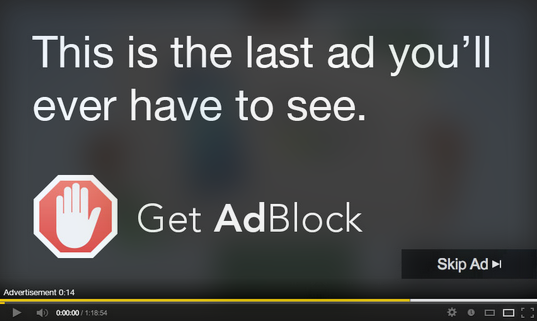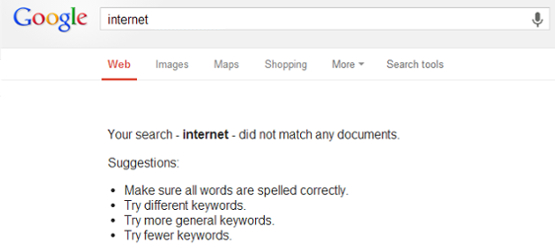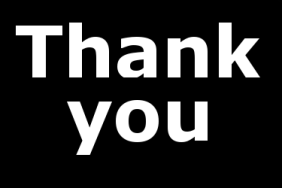Editor’s Letter is a series of ongoing articles on the state of PSLS, its future and the future of the industry as a whole.
I’ve talked about ad blocking before, but today I don’t just want to focus on any personal impact, but rather the future AdBlock claims it aims for, and delve deeper into what the true ramifications of an ad-free internet are.
Full disclosure: My entire livelihood, health and future is based on a system that AdBlock is trying to eradicate, so bias probably exists.
In a bizarre announcement over the weekend, AdBlock revealed their latest plans – to advertise AdBlock using crowdfunding. So far, with 27 days still left, the company has raised $30,778 for online ads, and hopes to be able to get enough to advertise on The Times Square Billboard, in a full page spread on The New York Times, and during the 2014 Super Bowl. The company aims to educate the world about their plugin that removes ads from sites, despite them being the primary source of funding for the majority of the internet.
The reason why? Because “everyone deserves a better Web.”
It’s hard not to get sucked into believing their video that promises a beautiful future that we will create ourselves. “We have the power to reshape [the web] for everyone”, simply by blocking ads forever. In fact, the wording is eerily similar to the Ouya’s Kickstarter campaign that aimed “to upend console gaming.” Check it out here:
Before I get into the real nitty-gritty, I first must point out that them saying “we’re not taking a dollar ourselves” is utterly disingenuous. AdBlock is a profitable business at the moment from the donations they receive, so if everyone helps them double or triple their userbase, their profits will rise in turn. That’s obvious. Give any company a ton of money for advertising and, sure, they might not spend it on themselves, but they damn will spend the money they get from all the new users on themselves.
Then, of course, there’s the massive irony of AdBlock hosting the video on YouTube, a site where they plan to run ads that will try to take away their major revenue source. YouTube is a site that ran at a significant loss for years, even with ads. YouTube also generally allows you to skip them after 5 seconds, and often shares the profits with creators. And, as a user generated site, this isn’t just a faceless corporation that will be hurt by its closure, but the community that creates content for it, and the viewers that use it. It’s far from the evil, spammy, dangerous and broken system that AdBlock makes it out to be.

See that’s the biggest problem with AdBlock’s message – it tars all of the internet with the same brush. Because bad sites do bad things, like tons of pop ups or even malware, the entirety of the web is being penalized. YouTube, the site that made it easy for them to show a video to thousands of people for free, is being put at risk.
Now before anyone launches into a giant tirade about how sites can apply to AdBlock Plus’ Acceptable Ads program, it’s important to note that AdBlock is a different program to AdBlock Plus. AdBlock, the guys running this campaign, have no such acceptable ads scheme. Sadly, this confusion has likely helped them gain more funds, as users could easily be confused by the nearly identical name and logo.
What’s so frightening is that AdBlock are trying to eradicate all advertising, without any ads program, even though there is no known, feasible, widespread alternative to it.
Paywalls – the requirement to pay to read a site – are always a controversial revenue source for websites, and can be a way to replace ads. Unfortunately, this is something that only larger sites can manage, both from a logistical perspective (secure payments, custom accounts, etc), and a business standpoint (if you lose 90% of your readership, can you still survive?). Plus, even if it was something that could be done, is that what you’d want? As someone who runs a site, I don’t want to charge people, especially the ones that have supported us by viewing our ads. Equally, as a reader of literally thousands of websites every week, and someone already paying an ISP, I don’t want to – nor could I afford to – pay for that lifestyle. And as a person who does actually want the internet to be a better place, I’m worried that paywalls will severely impact competition – it will be harder to start a new site, and people already paying for one site will be unlikely to pay to see a similar one.
But despite this, and despite most people not wanting to pay for access to every website, it may become inevitable. Donations can bring in money for some sites, but it’s still not a viable future. Rock, Paper, Shotgun, a much larger gaming site than PSLS that does accept and promote a donations portal, wouldn’t be around without the additional funds of ads, RPS’ Alec Meer said on Twitter:
We couldn’t keep running RPS without them. It’d have closed down years ago, in fact. Sure same is true of any number of other sites.
And, yet again, a donations-style internet gives an unfair advantage to older sites who have built up a fanbase, and would make it extremely hard to launch anything new. So older sites will struggle on lower revenue, while new ones will be untenable.
In short, there is no possible way this will make the internet anything but worse.
Bonus Round:
Ok, if you read that as “AdBlock are bad, but AdBlock Plus allow some ads, so they’re ok”, I might as well share my thoughts on them too. This is what’s wrong with AdBlock Plus’s Acceptable Ads program:
- You can choose to block all ads with AdBlock Plus.
- AdBlock is able to have complete and utter control over what they define as acceptable, some of which have been criticized as overly strict.
- If you are a small website, you may not be able to have as much control over advertising. News sites will also likely need to work closer with advertisers, which impacts press impartiality dangerously.
- AdBlock takes money from corporations, such as Google, when they decide to whitelist them. This, again, gives them a dangerous level of control.
- The fact that AdBlock is responsible for controlling what is accepted goes directly against their assertions that “Adblock Plus’s position is not to pass judgment on whether advertising is good or bad, but rather to give users the tools to decide for themselves what type and what level of online advertising they will accept.”
But let’s just say every ad company in the world agreed to AdBlock Plus’s Acceptable Ads program, surely that would solve this whole problem, right? Unfortunately, no. Banner ads that do not flash aggressively, do not contain malware, do not rotate and do not pop out are not accepted by AdBlock, only static ones are – and the amount of revenue that those earn are a fraction of what the still-non-intrusive ads that AdBlocker bans earn. Most sites could not remain profitable with those restrictions, and if they were forced to accept them, the only noticeable result for readers would be site closures, staff layoffs, and a drop in quality.
The End:
The purpose of this Editor’s Letter isn’t to get you to stop using an adblocking program if you use one, but rather at least give you some insight into a site manager’s perspective of a company raising tons of money for itself on the promise of making the internet a better place by removing its main source of revenue. I would love no ads, and it’d be incredible if that could be achieved without ads, but some things just require funding, simple as that. Just wishing that everything will turn out well will not make it so.
It’s fun to dream, but eventually we have to wake up.








